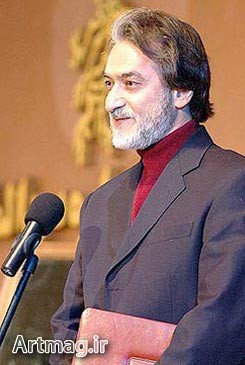
● Birthplace: Tehran
● Website: www.majidentezami.com
Biography
He started learning music at the beginning of his primary education, and a year after graduating from high school, he entered the symphony orchestra and learned the instrument of the oboe under the supervision of Antoine Catalos. He studied salfage, theory and harmony with Samin Baghcheban and Mostafa Kamal Portrab and wrote the first music note with Portrab’s help. He then traveled to Germany to treat kidney disease and continue his education, where he went to university and graduated from the Berlin Conservatory. In Germany, he continued to study music with masters such as Karl Stein and collaborated with many orchestras such as the Berlin Symphony Orchestra and the German Philharmonic Orchestra. In 1974, after returning to Iran, he was hired by the Tehran Symphony Orchestra and began teaching at the University of Tehran and the Higher Conservatory of Music in the same year, making pieces for the Center for the Intellectual Development of Children and Adolescents. His first experience in visual music was with the making of short film music: Zal and Simorgh in 1977, and with the making of film music: Safar Sang, he started making film music professionally. He has written more than 80 films since the 1970s and is one of the most prolific composers in Iranian cinema. His other works include about 10 stage music, some of which he has performed as a musician. Master Majid Entezami has also taught at the Faculty of Music of the University of the Arts and has been the judge of the 29th Fajr Film Festival. His wife, Azarnoosh Sadr Salek, is a harpist, pianist and music teacher.
Master Majid Entezami, who received 4 Crystal Simorghs for his films Cycle by Run, Day of the Incident, Glass Agency and Crazy Jumping Cage, along with Hossein Alizadeh and Mohammad Reza Aligholi, won the most Crystal Simorgh in the best music category of the Fajr Film Festival. Entezami is one of the winners of the 8th Conference of Enduring Faces in 2010 and in 2014, as a jihadist in the field of culture and art, he received the Medal of Honor. He is the living son of Ezatullah Entezami, an actor in Iranian cinema.
Awards
– Crystal Simorgh winner Best Artistic Achievement for Film: Crazy Cage Jumps – 21st Fajr Film Festival
– Crystal Simorgh wins Best Soundtrack for a Movie: Bicyclone – 7th Fajr Film Festival
– Crystal Simorgh winner Best Soundtrack for Film: The Glass Agency – 16th Fajr Film Festival
– Crystal Simorgh winner Best Soundtrack for the Movie: Event Day – 13th Fajr Film Festival
– Honorary Diploma for Best Soundtrack for the Movie: The Secret of the Dagger – Eleventh Fajr Film Festival
– Honorary diploma for best soundtrack for film: From Karkheh to Rhine – 11th Fajr Film Festival
– Golden Statue Winner Best Soundtrack for Movie: Crazy Cage Jumps – Seventh Cinema Celebration
– Winner of Golden Statue Best Soundtrack for the Movie: Nora – Sixth Celebration of Cinema House
– Golden Tablet winner Best soundtrack for the film: Tren – The 6th Fajr Film Festival
– Crystal Simorgh nominated for best soundtrack for the film: Duel – Twenty-second Fajr Film Festival
– Crystal Simorgh nominated for best soundtrack for film: Protest – Eighteenth Fajr Film Festival
– Crystal Simorgh nominated for best soundtrack for film: Nun & Goldon – 14th Fajr Film Festival
– Crystal Simorgh nominated for Best Soundtrack for Honor – The 13th Fajr Film Festival
– Candidate for Golden Statue Best Soundtrack: Duel – Ninth Cinema Celebration
– Candidate for Golden Statue Best Soundtrack: Afghan Bride – Eighth Cinema Celebration
– Candidate for Golden Statue Best Movie Soundtrack: I Have a 7 Year Song – Sixth Celebration of Cinema
Works
Music of Movies
1977 – Stone Travel
1981 – Under Siege
1981 – Sunshine
1981 – Red Line
1983 – File
1983 – Sardar Jangal
1983 – Senator
1984 – Eagles
1984 – Ashianeh Mehr
1985 – Broken gun
1985 – Rain Cycle
1985 – Storm
1985 – Plaque
1986 – Mission
1986 – Salesman
1986 – Thief and Writer
1986 – Passage
1986 – High School
1987 – Train
1987 – Crisis
1987 – Kani Manga
1987 – Fear
1987 – Simorgh
1988 – Yellow Canary
1988 – Pit
1988 – Dome of Light
1989 – The last flight
1989 – Rajaei School
1990 – Hidden fire
1990 – Iblis
1990 – The sea for you
1990 – Wishing for marriage
1990 – The Secret of Kokab
1990 – Glass eyes
1990 – O negative
1990 – The night of the Twenty-Ninth
1991 – Evinar
1991 – Putin
1991 – Exiles
1991 – Nasser al-Din Shah, Cinema Actor
1991 – Connection of Nikan
1992 – Unfinished Man
1992 – From Karkheh to Rhine
1992 – The Secret of the Dagger
1992 – Prey
1992 – Azarakhsh
1992 – One Night And One Stranger
1992 – Suspicion
1992 – Under The Sky
1993 – Event Day
1993 – The Last Blood
1993 – Last blow
1993 – Great Dream
1993 – Exchange
1994 – Heart And Stickers
1994 – Attack on H3
1994 – The Way of Pride
1995 – Survivor
1995 – Nun and Goldon
1995 – The Smell of Yusuf’s shirt
1995 – Sunny Man
1995 – Enemy
1995 – The Peak of the World
1996 – Speed
1997 – Apples
1997 – Glass Agency
1998 – Silence
1998 – Love Without Borders
1999 – Protest
2000 – Holy Mary
2001 – I am 15 years old
2001 – Nora
2002 – Crazy Jumps Out of A Cage
2002 – Naghmeh
2003 – Duel
2003 – Afghan Bride
2004 – A place to live
2004 – Large Drum Under The Left Foot
2009 – Zamhrir
2010 – And The Blue Sky
2014 – P22
TV Series Music
1996 – The only commander
1997 – Men of Angeles
2008 – Sheikh Baha’i
2013 – Pahlavi hat
Symphony
– Sacrifice
– Islamic Revolution
– Resistance
– Khorramshahr
– Read This Chapter With Me
– Peace
Music Album
The album “Silent More Than the Sea” is one of his lasting works.
Sardar Sardar’s only album with the voice of Mohammad Isfahani and his composition has been released.
Symphony of Resistance
This symphony is Majid Entezami’s second trilogy in memory of the Iran-Iraq war. The symphony is made up of four parts, titled: Ascension, Growth, Hope and Resistance, commissioned by the Martyr Foundation. The first performance of this work was held in Tehran’s Vahdat Hall.
Ascend Piece
The piece begins at a slow pace, and the orchestra and choir performances are reminiscent of movement and conduct, followed by a slow melody with worries about the concept of ascension. This piece, which is followed by the accompaniment of the choir, evokes the bravery and hard work of the people, then the whole band joins in with the melody and resonates the epic poems, a homage to Iranian determination and at the end of the piece. The immortality, grandeur, and meaning of Sirukouk are heard in the sound of this melody.
Growth Piece
This piece describes the current of the universe, and its poems are written for the immortality of the Motherland; it is performed with special tranquility, with instruments such as guitar, mandolin, harp, piano and traditional singing, pop and chorus.
Hope Piece
This piece begins in the double minor, with the use of string and wind orchestra and then other parts of the orchestra are added to it. Hoping that they are on the path to resistance, the human spirit is driven by the principle of resistance and hope. The features of this piece include the combination of the two voices of Mohammed Abdul Hosseini and Nima Masiha.
Resistance Piece
The final part of this symphony is accompanied by a sharp tempo, this flourishing part of the concept of resistance and the birth of love and faith that are essential to human life and life. This piece is performed by the voice of Mohammad Abdul Hosseini in a traditional structure.
Musicians And Practitioners
– Assistant to Composer: Azernoush Sadersalk
– Recording Supervisor: Mehdi Bozorgmehr
– Violin: Khachik Babayan, Maziar Zahireddini, Ali Jafari Pouyan, Bardia Kiaras, Pedram Fariousfi, Milad Alemi, Mohammad Reza Arabani
– Viola: Meysam Moravasti, Sohrab Barhmandi, Pouya Khosh Ahang
– Cello: Majid Esmaili, Mehrdad Alemi, Sogol Shiri
– Contrabass: Karen Kabiri
– Flute: Nasser Rahimi
– Abuja: Majid Entezami
– Horn: Barbados Bay
– Trumpet: Hassan Farahani
– Percussion and percussion: Mahmoud Montazem Sedighi
– Percussion Dumps: Cyrus the Great Pour, Saeed Sertaie
– Drums: Hooman Ghaffari
– Guitar: Firouz Vissanloo
– Bass Guitar: Babak Riahi Pour
– Piano: Reza Tajbakhsh
– Harp: Aznarush Sadersalek
– Choir: Sudabeh Shams, Fahimeh Esmaili, Nasrin Nashei, Shahram Rokouie, Mohammad Reza Safi, Mohammad Reza Sadeghi
– Music recording: Studio Pop, Nasser Farahodi, Hamid Reza Adab



